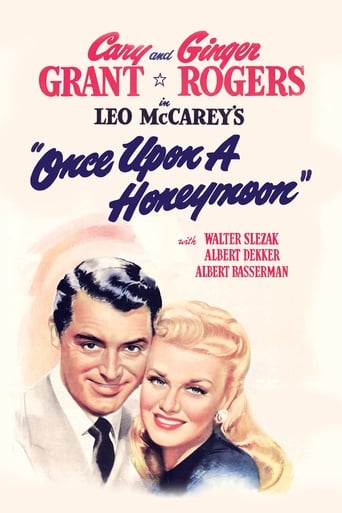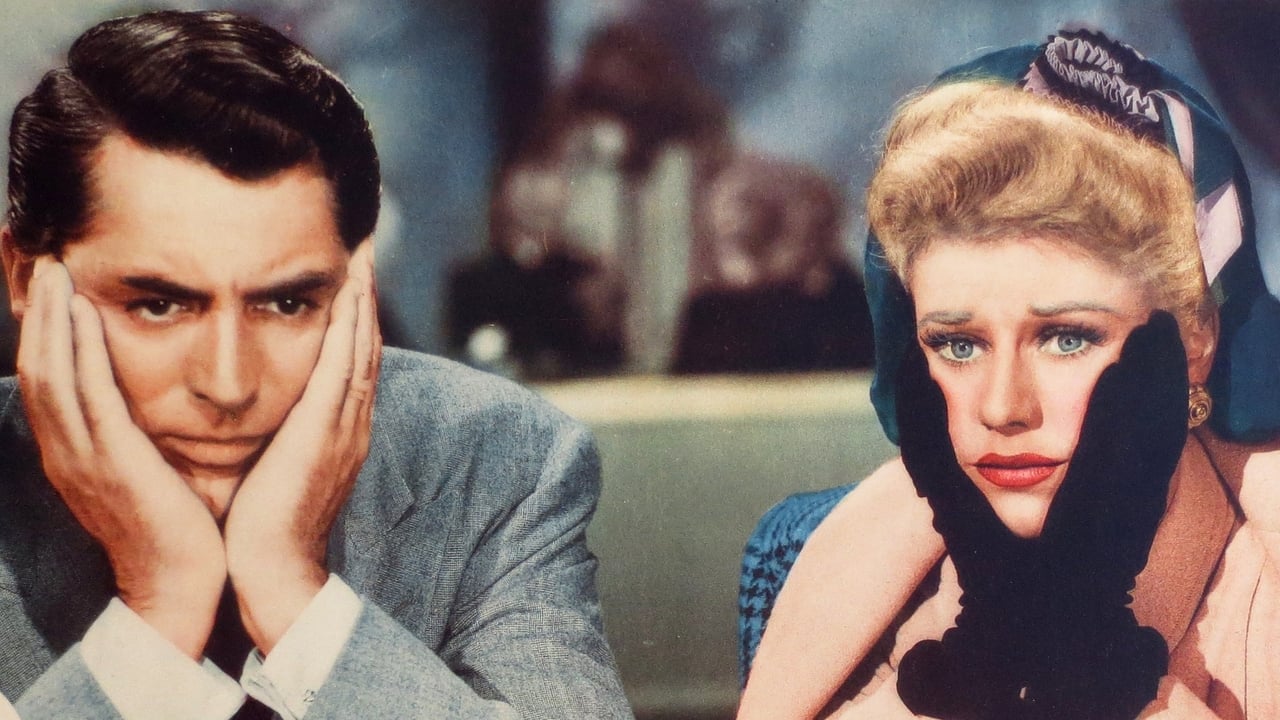JohnHowardReid
Producer: Leo McCarey. A Leo McCarey Production. Copyright 4 November 1942 by RKO-Radio Pictures, Inc. New York opening at the Radio City Music Hall: 12 November 1942. U.S. release: 4 November 1942. Australian release: 5 August 1943. 10,661 feet. 118 minutes.SYNOPSIS: An ex-burlesque dancer from New York marries an Austrian baron on the eve of WW2. A newspaperman tries to put her wise to the fact that the baron, far from being the patriot he pretends to be, is actually a front man for Hitler.NOTES: Nominated for an Academy Award for Sound Recording, but lost to Yankee Doodle Dandy.COMMENT: An uneasy mixture of both romantic and slapstick comedy with a more serious spy melodrama. Unpopular with both audiences and critics in its day, it is still a difficult film to enjoy even today, though the problem now is not quite as much its disquieting mixture of styles (even a normally super-reliable player like Slezak seems at sea in at least one of his scenes) as the unnecessary verbosity of its script. Unfortunately the garrulousness of the dialogue continues unabated from the first scene to the last, making each individual scene not only irritatingly drawn out but next to impossible to trim. Nor is this incessant impetus to surround witty dialogue with word clusters of a more mundane variety, the only script problem. In its serious moments, the plot is utterly unbelievable. Unfortunately at these moments, humor is not intended. Even worse is the way the scriptwriters facilely resolve potentially intriguing plot situations. We have a bit of suspense for instance when Grant and Rogers are trapped on their way to a Jewish internment camp. How do they get out of this tricky situation? The American ambassador intervenes. And right at the climax, here's heavy Slezak threatening the slim Rogers as she stands alone on the top deck of a ship. So what happens. Off-camera she does an absolutely impossible thing. Poor Slezak has a hard time of it, though he does manage most of the movie with his usual menacing flair. Grant of course is Grant, full of silly giggles, foolish impersonations, cheeky bravura and patriotic gravity. Miss Rogers gives the film's best performance because her role is conceived on a more believable plane. Her facility with accents helps. And she's stunningly costumed too. The support players are effective, though aside from Dekker (who doesn't come in till near the end), Lytess (later to win fame as Marilyn Monroe's dramatic coach), Boros (who disappears after some lengthy introductory scenes) and Shannon, most including Basserman have very little to do.McCarey's directing style doesn't help smarten the sluggish pace. He has chosen to handle the movie in TV style with lots and lots of close-ups. A feast for Rogers and Grant fans no doubt but unhelpful to those of us who wish he'd get on with moving the story along. Fortunately he does exhibit some of the felicitous touches of The Awful Truth like the swastika hands of Hitler's clock and Grant's smiling face outside the carriage window. But his timing is generally too slow, he over-milks every scene for more humor than it's worth. Some clever remarks, like Grant's sly comment that he came after facts but all he got were figures, are usually lost in the chatter.Production values are impressive. A pity the script is so constructed that trimming is virtually impossible. It would be at least twice the fun at two-thirds the length.
Edgar Allan Pooh
. . . with CASABLANCA's special effects prowess, you'll start getting into the mood for ONCE UPON A HONEYMOON. Throw in some "Jew for a Day" shenanigans from THE BOY IN THE STRIPED PAJAMAS, and you know that this flick will be good for a barrel of laughs. Throughout ONCE UPON A HONEYMOON "Dolfie" Hitler Himself keeps turning up like a glad Benny due to the miracle of Archival Footage. HONEYMOON first came out during Hitler's Heyday, as Der Fuhrer still basked in the afterglow of beating D.J. Trump to Time Magazine's hallowed and greatly esteemed "Man of the Year" Award. RKO Radio Studio could NOT forecast the outcome of World War Two with any certainty when they released HONEYMOON, which explains why this flick is so "Fair and Balanced" toward ALL SIDES. Since multiple copies of HONEYMOON were retrieved by the Nazi Navy from torpedoed and sinking Allied Troop Ships, it's a safe bet that Dolfie Himself got many a chuckle while watching it a time or ten in his Bunker. HONEYMOON does for Occupied Europe what ROMAN HOLIDAY would later do for the Homeland of Hitler's Brat-Biting Buddy (if you recall that Pre-Weird Al apocryphal verse to "Whistle While You Work"), B. Mussolini.
jzappa
Leo McCarey helms this 1942 lark, whose moods and genre conventions---saccharine romance, espionage adventure, screwball farce and war-time propaganda---swing to and fro so regularly that it's difficult to be bored even when the tipping scales of narrative contrivance become somewhat stressful at times. It's soapboxy-er than its early blitheness suggests, and at one point, the customary lead comic duo is mistaken for Jews and have a close shave with quite a grim fate. At times, because of the nonsensicality of the wildly contrived plot, the brashness of swastika hands on clocks and downer developments initially feel mislaid before they're consistently salvaged by a highly competent group of surprisingly naturalistic and genuinely funny performers, but meets its challenges admirably when it matters.Vienna, 1938. Ginger Rogers plays Katie O'Hara, a Brooklyn dancer who's flown off to marry the rich and high-ranking Austrian Baron Von Luber, a Nazi VIP on the sly, for status and prosperity. Chin dimple extraordinaire Cary Grant plays hyper-transatlantic correspondent Pat O'Toole, who receives a job as a radio commentator to obtain a rare interview with the impending baroness to expose the Baron as a Nazi undercover. The Baron is played by Walter Slezak, that indelible character actor who managed to get pigeonholed as cunning Nazis. You may recognize him from Hitchcock's Lifeboat. Pat's not deterred by Katie's unwillingness to be questioned, and manages to meet her posing as a tailor.Obviously, the reporter becomes smitten with Katie and frantically attempts to disabuse her regarding her fiancée. A turning point slams into this happy-go-lucky buffoonery when Hitler takes Austria, and Katie begins to learn the truth about her new husband's dealings. The two brash Yankees team up and go on the lam through Norway, Holland and Belgium before sudden sabotage missions are sprung on them and create grave dramatic tension. "This is the sort of thing that can make a man a Republican!" he huffs.I had my doubts about Ginger Rogers. Not having seen many of her best known films such as those with Fred Astaire, I thought she may prove yet another example of how incomparable Irene Dunne was alongside Archie boy. About forty minutes into Once Upon a Honeymoon, I was firmly disabused of my presumptions. She has an inborn knack for being natural in a way that even transcends the stagy tenets of the Golden Age, saying a lot without saying much, and saying something different with her face than what she's saying with her mouth. I can't say this excuses the inanity of Archie earlier on managing to trick her so effortlessly into thinking straight vodka is a glass of water, but overall, she's not an uncomplicated Dumb Blonde Type present only to hang off Cary Grant's shoulder. McCarey takes the time to photograph her surprisingly emotive disillusionment about the state of affairs around her.I'm frankly willing to forego any criticisms or dismissals of any moments that border on cornball or lugubrious purely for reward of the scene where O'Toole and Von Luber finally happen upon one another and have a man-to-man sit-down. It's one of those delicately cool scenes where two characters hold their cards firmly against their vests, but say just enough and share just enough sidelong glances to be satisfied of the other's hand. It's an exciting scene that raises the stakes and ratchets up the tension in a subdued, completely unexpected way. In fact, McCarey and his cast are so graceful that it only falls apart when it finally reaches the bungled ending, which I suppose is what happens when you try to balance propaganda and slick storytelling. Regardless, though quite the opposite of cynical or acerbic, it has a streak of the spunk and cunning of a Billy Wilder film, or the "shpontanuity," as one of the Baron's comrades suggests.
vincentlynch-moonoi
I quite disagree with many of the reviews here of this film. I'm very impressed, overall, with this story because it is an unusual mix of humor, drama, and tragedy. An early scene -- where Cary Grant and Ginger Rogers meet for the first time -- unique with uncanny humor and chemistry. Contrast that with the scene where the two are imprisoned with Jewish rabbis possibly heading for a concentration camp and singing their Jewish prayers, followed by a scene where it is subtly thought that Rogers could be sterilized.I'm not always a fan of old films that involve a little espionage as WWII breaks out. But this one is different. Here, Katie O'Hara (Ginger Rogers), an ex-American burlesque performer has landed an Austrian Baron (Walter Slezak) and is about to be married. An American news correspondent (Cary Grant) pretty much know that the Baron is a Nazi. After the marriage, Rogers begins to suspect that Grant's suspicions about the Baron are accurate. Rogers, with Grant's help, decides to flee Europe, but they are nearly sent to a concentration camp. An American double agent persuades Rogers to return to her marriage and temporarily work as a spy. The Baron becomes suspicious due to O'Hara's many questions, where early in their relationship she was quite content to ignore politics. Grant agrees to broadcast pro-Nazi propaganda -- which he plans to sabotage -- after the Baron threatens to turn Rogers over to the Gestapo. Rogers and Grant do escape, and board a ship for America, but guess who is also on board -- the Baron...heading for America to continue being subversive in the ultimate target -- the United States.Unfortunately, after the Baron is pushed overboard and drowns, the heretofore relatively dramatic movie turns almost slapstick as Grant's conscience makes him tell the captain that the Baron has fallen overboard, the ship is turned around, but then they decide the Baron couldn't swim and it must be too late. The ship heads back toward America. This very last section of film is just plain dumb, and the one serious miscalculation of the film (were it not for this I would have given it an "8".Grant here is wonderful, as he normally is. I've always thought as Rogers as a "good" actress, but she is better here than is typical. And, Walter Slezak does a fine job as the Baron. Few other actors are worth mention here, although Albert Dekker is quite good in his relatively brief, though key role. And, although you are unlikely to recognize him, John Banner -- much later Sergeant Schultz on Hogan's Heroes -- is a Nazi in the film.



 AD
AD


